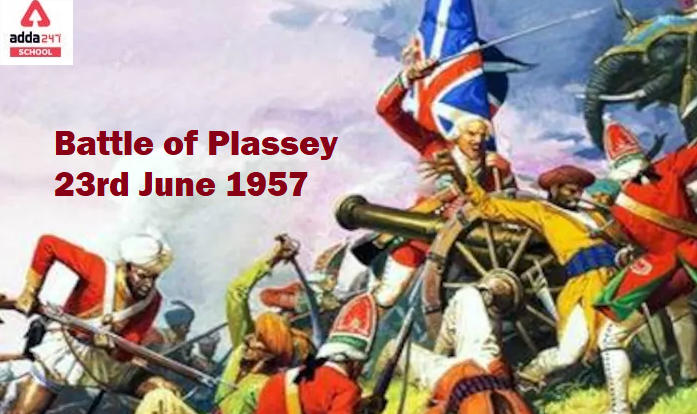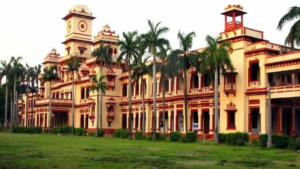Battle of Plassey was Fought Between
The Battle of Plassey was a major victory over the Nawab of Bengal and his French allies by the British East India Company, led by Robert Clive. The combat ended on June 23, 1757. The Company was able to gain control of Bengal as a result of the conflict. The British took control of most of the Indian subcontinent, Myanmar, and Afghanistan over the next hundred years.
The Conflict of Plassey is named after the battle that took place at Palashi. It occurred at the Hooghly River’s banks, around 150 kilometres north of Calcutta and south of Murshidabad. Murshidabad was the capital of Bengal Subah during the time.
Nawab Siraj-ud-Daulah and the British East India Company were the combatants. The last independent Nawab of Bengal was Nawab Siraj-ud-Daulah. He had succeeded Alivardi Khan as Nawab of Bengal the previous year. The English had been told to stop expanding their fortifications by the newly proclaimed Nawab. Robert Clive bribed Mir Jafar, the Nawab’s army commander-in-chief, and won the fight as a result of his deception. He had also promised Mir Jafar that he would elevate him to the position of Nawab of Bengal. In this battle, Clive defeated Siraj-ud-Daulah at Plassey in 1757.
The East India Company, led by Robert Clive, defeated the Nawab of Bengal (Siraj-Ud-Daulah) and his French Troop in the Battle of Plassey. The Battle of Plassey is known as the ‘decisive event,’ as it was the cause of the British’s final control in India. Battle of Plassy sow seed of the rule of the British empire in India. The Battle of Plassey was a game-changer in modern Indian history, resulting in the establishment of British power in the country. The fight took place at the end of the Mughal Empire’s tenure. When the Battle of Plassey took place, the Mughal emperor Alamgir-II was in charge of the empire. The Battle of Plassey took place in West Bengal on June 23, 1757. In this article, we will discuss the background of the battle of Plassey, its causes, and other major details concerning the Battle of Plassey. The readers can bookmark this page to get all the related articles.
Battle of Plassey: Reason
Nawab Siraj-ud-Daulah launched an attack on British-controlled Calcutta before the war. Colonel Robert Clive and Admiral Charles Watson led reinforcements from Madras to Bengal and regained Calcutta. Clive then took the initiative to attack the French fort of Chandernagar. The Battle of Plassey was fought during the Seven Years’ War, and it culminated in tensions and suspicions between Siraj-ud-daulah and the British. Furthermore, the French East India Company had dispatched a small force to battle the British. Siraj-ud-Daulah, who commanded a substantially stronger force, made his stand at Plassey, where the British were concerned about being outmanned. The British, on the other hand, conspired with Siraj-ud-Daulah’s deposed army chief Mir Jafar. Several more, including Yar Lutuf Khan, Jagat Seths, Umichand, and Rai Durlabh, joined Mir Jafar. Mir Jafar, Rai Durlabh, and Yar Lutuf Khan also refused to fight and plotted against the Nawab. They gathered their forces near the battleground but made no attempt to join the fight. The army of Siraj-ud-Daulah, which numbered around 50,000 men, comprised defectors. Aside from it, there were 40 guns and ten war elephants on the battlefield. Due to the escape of Siraj-ud-Daulah from the battlefield and the passivity of the conspirators, his army was beaten by 3,000 soldiers under Col. Robert Clive, and the battle lasted around 11 hours.
The readers must know the background or history of why the battle of Plassey happened. What are the causes and how did it start? Here is the background, Siraj-Ud-Daula was replaced as Nawab of Bengal by his grandfather Alivardi Khan. Siraj-Ud-Daula had become the Nawab of Bengal before a year of his succession, and he had ordered the English to stop expanding their fortifications because the triumph of the British in the Carnatic wars has made Siraj-Ud-Daula fearful about the British’s growing influence in India. The Company’s officials made extensive use of their trading advantages, which harmed the nawab’s finances. The British strengthened Fort Williams without Nawab’s approval, which enraged him even more. He marched to Fort Williams and arrested 146 Britishers, imprisoning them in a cramped chamber, which resulted in the deaths of 123 Britishers. Calcutta’s “Black Hole Tragedy” is the name given to this tragedy. As a result, Robert Clive was dispatched to Bengal to establish the British presence there. He bribed several of the Nawab of Bengal’s top officials and offered Mir Jafar kinship in exchange for his betrayal of the Nawab.
Battle of Plassey was Fought in 1757 near Bhagirathi
On June 23, 1757, the Battle of Plassey was fought at Palashi, near Calcutta, on the banks of the Bhagirathi River. There was a torrential downpour after three hours of fierce warfare. Apart from Mir Jafar’s betrayal, one of the causes for Nawab’s defeat was a lack of preparedness to preserve their weaponry during the torrential downpour, which tipped the scales in favor of the British force. Robert Clive’s army of 3,000 troops destroyed Siraj-Ud-army Daulah’s of 50,000 warriors, 40 cannons, and ten war elephants. The flight lasted 11 hours, and Siraj-Ud-Daulah retreated after being defeated. According to Robert Clive, British forces killed 22 individuals and wounded 50 others. The Nawab army lost roughly 500 troops, including some high-ranking leaders, and many of them were killed.
Battle of Plassey Date and was Fought Between
On 23 June 1757, The main characters of Battle of Plassey are Siraj-Ud-Daulah (Nawab of Bengal), Mir Jafar (Commander-in-Chief of Nawab’s army), Jagat Seth (Influential Banker), Rai Durlabh (One of the Commanders of the Nawabs Army), Robert Clive (EIC), and Omi Chand (Bengal Merchant). Let us know their role and contribution in the Battle of Plassey:
Robert Clive: Robert Clive played an important role in the Battle of Plassey he fought from the East India Company’s side, he gave asylum to Krishna das. Krishna das was a political fugitive, this action of Robert clive disappoint Siraj-Ud-Daulah. Robert clive misuse the trade privileges given by nawab, which resulted in a reduction in the treasury of Nawab. Robert Clive fortified Calcutta without the permission of nawab.
Mir Jafar: East India Company bribed Mir Jafar to conspire against Siraj-Ud-Daulah. EIC told Mir Jafar that they will make him Nawab of Bengal. Mir Jafar cheated Siraj-Ud-Daulah in the Battle of Plassey.
Siraj-Ud-Daulah: Siraj-Ud-Daulah Involved in a Tragic Black-Hole Situation (146 English people were imprisoned in a very small chamber, and 123 of them died of suffocation as a result). The EIC’s widespread abuse of trade rights has had a negative impact. When the English fort at Calcutta was attacked and taken, it exposed their animosity.
Rai Durlabh: He was one of Siraj-ud-daula’s army commanders, but he betrayed Nawab after being paid by the East India Company.
Jagat Seth: At the time, Jagat Seth was Bengal’s biggest banker. He was a participant in the plot that resulted in the detention and assassination of Nawab Siraj-Ud-Daulah.
Omi Chand: One of the main conspirators against the Nawab and a participant in the agreement made by Robert Clive before the Battle of Plassey in 1757.
Read More: Countries and Capitals
Battle of Plassey in Hindi
रॉबर्ट क्लाइव के नेतृत्व में ईस्ट इंडिया कंपनी ने प्लासी की लड़ाई में बंगाल के नवाब (सिराज-उद-दौला) और उसकी फ्रांसीसी सेना को हराया। प्लासी की लड़ाई को ‘निर्णायक घटना’ के रूप में जाना जाता है, क्योंकि यह भारत में अंग्रेजों के अंतिम नियंत्रण का कारण था। प्लासी की लड़ाई ने भारत में ब्रिटिश साम्राज्य के शासन का बीज बोया। प्लासी की लड़ाई आधुनिक भारतीय इतिहास में एक गेम-चेंजर थी, जिसके परिणामस्वरूप देश में ब्रिटिश सत्ता की स्थापना हुई। लड़ाई मुगल साम्राज्य के कार्यकाल के अंत में हुई थी। जब प्लासी की लड़ाई हुई, तो मुगल सम्राट आलमगीर-द्वितीय साम्राज्य का प्रभारी था। प्लासी की लड़ाई 23 जून, 1757 को पश्चिम बंगाल में हुई थी। इस लेख में, हम प्लासी की लड़ाई की पृष्ठभूमि, इसके कारणों और प्लासी की लड़ाई से संबंधित अन्य प्रमुख विवरणों पर चर्चा करेंगे। सभी संबंधित लेख प्राप्त करने के लिए पाठक इस पृष्ठ को बुकमार्क कर सकते हैं।
प्लासी का युद्ध क्यों हुआ, इसकी पृष्ठभूमि या इतिहास पाठकों को अवश्य जानना चाहिए। कारण क्या हैं और इसकी शुरुआत कैसे हुई? यहाँ पृष्ठभूमि है, सिराज-उद-दौला को उनके दादा अलीवर्दी खान द्वारा बंगाल के नवाब के रूप में प्रतिस्थापित किया गया था। सिराज-उद-दौला अपने उत्तराधिकार के एक वर्ष से पहले ही बंगाल का नवाब बन गया था, और उसने अंग्रेजों को अपने किलेबंदी का विस्तार बंद करने का आदेश दिया था क्योंकि कर्नाटक युद्धों में अंग्रेजों की जीत ने सिराज-उद-दौला को अंग्रेजों के बारे में भयभीत कर दिया था। भारत में बढ़ रहा प्रभाव कंपनी के अधिकारियों ने अपने व्यापारिक लाभों का व्यापक उपयोग किया, जिससे नवाब के वित्त को नुकसान पहुंचा। अंग्रेजों ने नवाब की मंजूरी के बिना फोर्ट विलियम्स को मजबूत किया, जिससे वह और भी नाराज हो गए। उन्होंने फोर्ट विलियम्स तक मार्च किया और 146 अंग्रेजों को गिरफ्तार किया, उन्हें एक तंग कक्ष में कैद कर दिया, जिसके परिणामस्वरूप 123 अंग्रेजों की मौत हो गई। इस त्रासदी को दिया गया नाम कलकत्ता की “ब्लैक होल त्रासदी” है। नतीजतन, रॉबर्ट क्लाइव को वहां ब्रिटिश उपस्थिति स्थापित करने के लिए बंगाल भेजा गया था। उसने बंगाल के शीर्ष अधिकारियों के कई नवाब को रिश्वत दी और नवाब के साथ विश्वासघात के बदले में मीर जाफर रिश्तेदारी की पेशकश की।
23 जून, 1757 को भागीरथी नदी के तट पर कलकत्ता के पास पलाशी में प्लासी की लड़ाई लड़ी गई थी। तीन घंटे की कड़ी मशक्कत के बाद मूसलाधार बारिश हुई। मीर जाफ़र के विश्वासघात के अलावा, नवाब की हार के कारणों में से एक मूसलाधार बारिश के दौरान अपने हथियारों को संरक्षित करने की तैयारी की कमी थी, जिसने ब्रिटिश सेना के पक्ष में तराजू को झुका दिया। रॉबर्ट क्लाइव की 3,000 सैनिकों की सेना ने 50,000 योद्धाओं, 40 तोपों और दस युद्ध हाथियों के सिराज-उद-सेना दौलाह को नष्ट कर दिया। उड़ान 11 घंटे तक चली, और सिराज-उद-दौला पराजित होने के बाद पीछे हट गए। रॉबर्ट क्लाइव के अनुसार, ब्रिटिश सेना ने 22 व्यक्तियों को मार डाला और 50 अन्य को घायल कर दिया। नवाब सेना ने लगभग 500 सैनिकों को खो दिया, जिनमें कुछ उच्च पदस्थ नेता भी शामिल थे, और उनमें से कई मारे गए थे।
23 जून 1757 को, प्लासी की लड़ाई के मुख्य पात्र सिराज-उद-दौला (बंगाल के नवाब), मीर जाफर (नवाब की सेना के कमांडर-इन-चीफ), जगत सेठ (प्रभावशाली बैंकर), राय दुर्लाभ (इनमें से एक) हैं। नवाब सेना के कमांडर), रॉबर्ट क्लाइव (ईआईसी), और ओमी चंद (बंगाल मर्चेंट)। आइए जानते हैं प्लासी के युद्ध में उनकी भूमिका और योगदान:
रॉबर्ट क्लाइव: रॉबर्ट क्लाइव ने प्लासी की लड़ाई में एक महत्वपूर्ण भूमिका निभाई, उन्होंने ईस्ट इंडिया कंपनी की तरफ से लड़ाई लड़ी, उन्होंने कृष्णा दास को शरण दी। कृष्ण दास एक राजनीतिक भगोड़े थे, रॉबर्ट क्लाइव की इस कार्रवाई ने सिराज-उद-दौला को निराश किया। रॉबर्ट क्लाइव ने नवाब द्वारा दिए गए व्यापार विशेषाधिकारों का दुरुपयोग किया, जिसके परिणामस्वरूप नवाब के खजाने में कमी आई। रॉबर्ट क्लाइव ने नवाब की अनुमति के बिना कलकत्ता की किलेबंदी की।
मीर जाफर: ईस्ट इंडिया कंपनी ने सिराज-उद-दौला के खिलाफ साजिश रचने के लिए मीर जाफर को रिश्वत दी। ईआईसी ने मीर जाफर से कहा कि वे उसे बंगाल का नवाब बना देंगे। प्लासी के युद्ध में मीर जाफर ने सिराज-उद-दौला को धोखा दिया था।
सिराज-उद-दौला: सिराज-उद-दौला एक दुखद ब्लैक-होल स्थिति में शामिल (146 अंग्रेजी लोगों को एक बहुत छोटे कक्ष में कैद किया गया था, और उनमें से 123 की मौत दम घुटने से हुई थी)। ईआईसी के व्यापार अधिकारों के व्यापक दुरुपयोग का नकारात्मक प्रभाव पड़ा है। जब कलकत्ता में अंग्रेजी किले पर हमला किया गया और कब्जा कर लिया गया, तो इसने उनकी दुश्मनी को उजागर कर दिया।
राय दुर्लभ: वह सिराजुद्दौला के सेना कमांडरों में से एक था, लेकिन उसने ईस्ट इंडिया कंपनी द्वारा भुगतान किए जाने के बाद नवाब को धोखा दिया।
जगत सेठ: उस समय जगत सेठ बंगाल के सबसे बड़े बैंकर थे। वह उस साजिश में भागीदार था जिसके परिणामस्वरूप नवाब सिराज-उद-दौला को हिरासत में लिया गया और उसकी हत्या कर दी गई।
ओमी चंद: नवाब के खिलाफ मुख्य साजिशकर्ताओं में से एक और 1757 में प्लासी की लड़ाई से पहले रॉबर्ट क्लाइव द्वारा किए गए समझौते में भागीदार।
After Effects of Battle of Plassey
Political Effects: In Bengal, the British became the most powerful European force. Robert Clive was given the title “Lord Clive,” Baron of Plassey, and was elected to the British House of Commons. The French army was defeated at the Battle of Plassey. The Nawab of Bengal, Mir Jafar, was crowned.
Economic Effects: India’s economy was seriously impacted. Following the triumph, the British began enforcing harsh laws and regulations on people living in Bengal in the name of tax collection.
Siraj-ud-daulah was one of Bengal’s most powerful rulers, and the British enlisted the cooperation of Siraj’s army leader to plot against him in the Plassey war. As a result of this plot, he lost the Battle of Plassey in 1757 and was later killed on the orders of Mir Miran, son of Mir Jafar, on July 2, 1757.
Mir Jafar, who obtained military assistance from the East India Company, succeeded Siraj-ud-daulah as the nawab of Bengal after his assassination. He was once the commander-in-chief of Siraj-ud-army, daulah’s but he betrayed him in the Plassey war.
He issued the Farman in 1765, granting the firm the whole Diwani of Bengal, Orissa, and Bihar, after becoming the Nawab of Bengal. In exchange for an annual payment, the Farman agreed to reimburse the British for Nizamat’s costs. Mir Jafar was not an independent Nawab, but rather an East India Company puppet. He captured numerous Bengal Parganas for the British but was eventually superseded by the East India Company due to a revolt against them.
Mir Jafar quickly realised that this negotiation was causing him financial hardship, prompting him to revolt against the company in order to acquire domination. However, he lost his position and riches as a result of it.
Mir Jafar died of leprosy later, and the East India Company appointed Mir Qasim as Bengal’s nawab.
Siraj-ud-daulah, The last independent Nawab of Bengal
Siraj-ud-Daulah was Mirza Muhammad Siraj-ud-nickname. Daulah’s Siraj ud-Daulah was Bengal’s last independent Nawab. The East India Company took control of Bengal at the end of his reign, with Mir Jafar as the Puppet King/Nawab. Mir Jafar, the commander of the Nawab’s army, betrayed Siraj ud-Daulah. Siraj thus lost the Battle of Plassey on June 23, 1757. The East India Firm’s armies, led by Robert Clive, invaded Bengal, and the company took control of the administration.
Read More: Sarojini Naidu: Biography, Poems, Books
Read More: Pollution Essay in English 1000 words









 CUET BHU Cut off 2025: Course-wise and C...
CUET BHU Cut off 2025: Course-wise and C...
 DAVV Result 2025 Out, Download Devi Ahi...
DAVV Result 2025 Out, Download Devi Ahi...
 Calicut University Timetable 2025 PDF Re...
Calicut University Timetable 2025 PDF Re...










